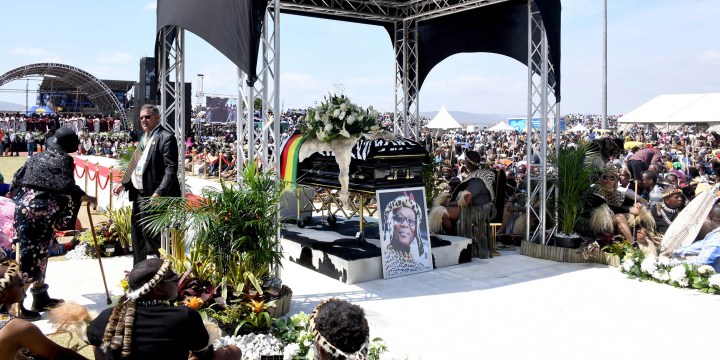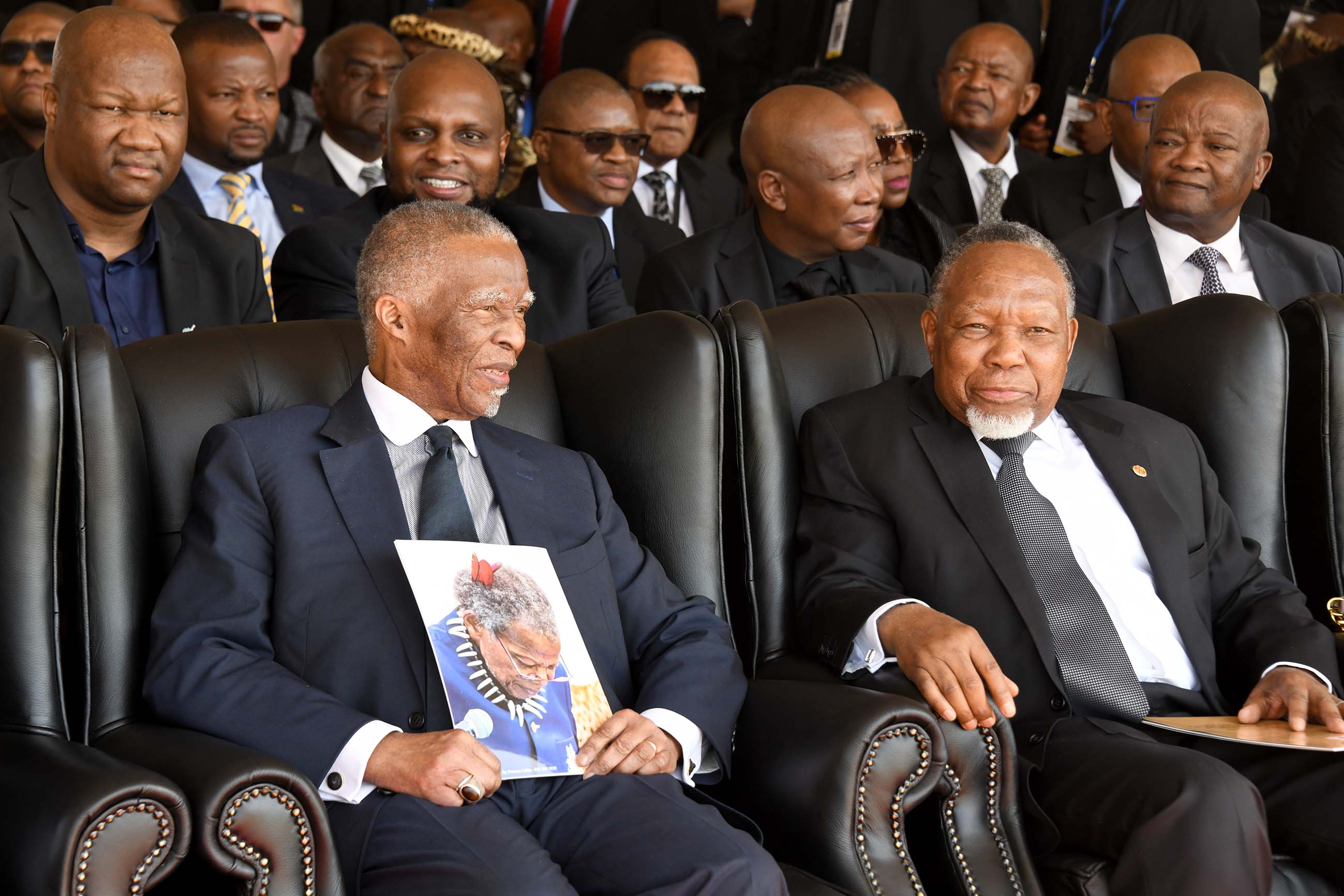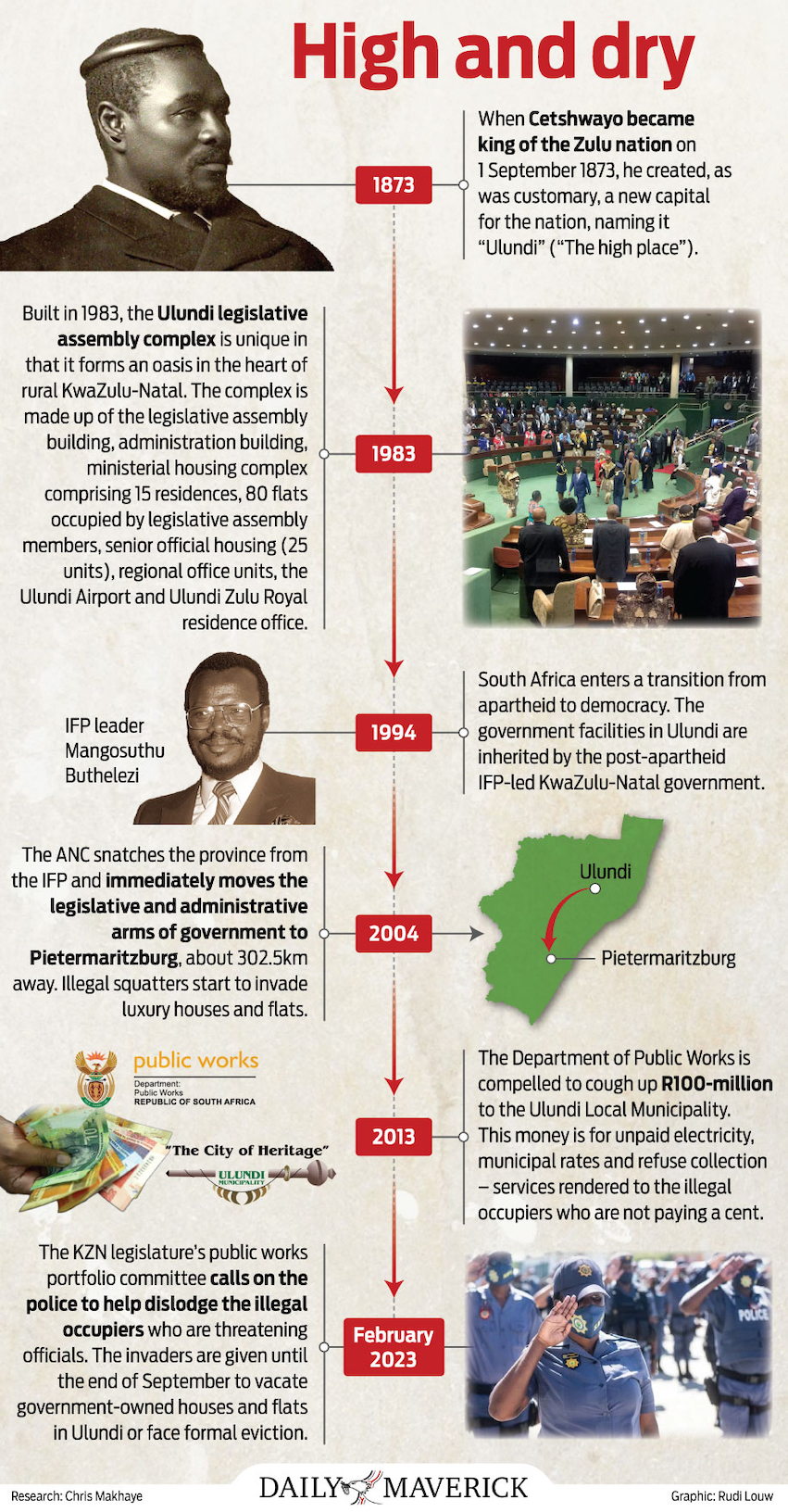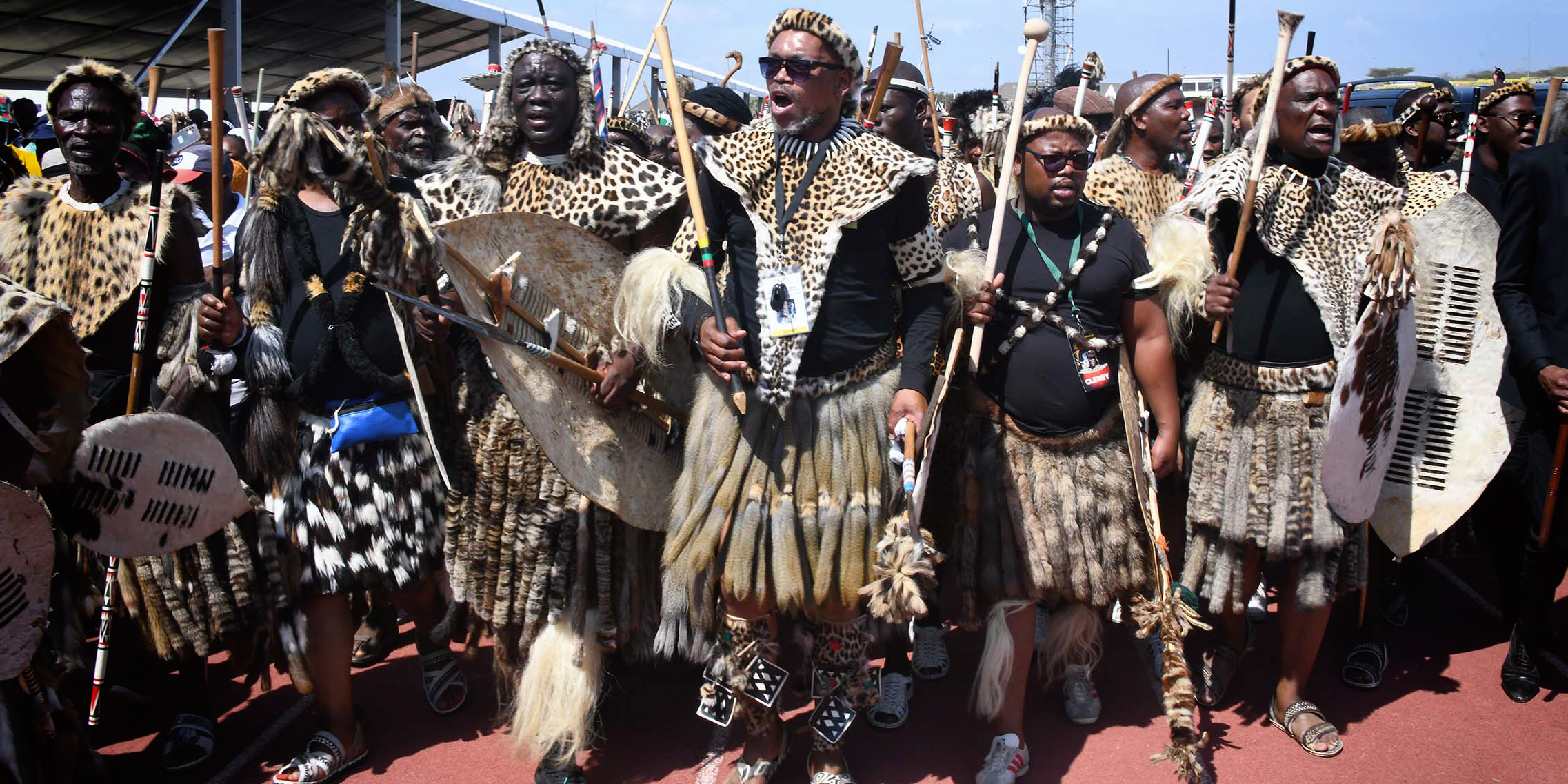ANALYSIS
Buthelezi’s absence could spark power struggle for KZN leadership with king and IFP president put to the test

Observers say it is vital for King Misuzulu kaZwelithini to quickly extend an olive branch to the Buthelezi clan while IFP leader Velenkosini Hlabisa needs to rapidly assert himself to maintain control of the party since the passing of Prince Mangosuthu Buthelezi.
The funeral of the founder of Inkatha Freedom Party leader and Prime Minister of the AmaZulu nation, Prince Mangosuthu Buthelezi has come and gone, leaving behind a polarised legacy and instability in the party he founded. He also leaves the Zulu monarch he revived and sustained for decades and the Zulu king he fought so hard to get installed, with whom he quarrelled in his final months and days.
Read more in Daily Maverick: Prince Mangosuthu Buthelezi: SA bids farewell to a divisive leader whose resilience and contention helped forge a nation
Buthelezi died on Saturday 9 September at the age of 95. His death sparked emotional public debates, with many people on different sides of his complex legacy. Some maintain that he was not only a sellout, but had taken instructions from apartheid leaders to take the war against liberation fighters and black communities. There are others who knew of the blights of his past but continued to admire the constructive role in support of the constitution he played since the advent of democracy.
Others, still, regard him as a cult hero who had served them with excellence and diligence, who rebuilt Zulu kingdom, revived its cultures and tradition and used his period as a leader of the KwaZulu homeland to bring about visible development. This development came in the form of schools, colleges and other institutions and other vital infrastructure. Even the town of Ulundi and the stadium where his funeral was held are synonymous with his name.

Former presidents Thabo Mbeki (left) and former vice president Kgalema Motlanthe (right) at the official state funeral of the late Prince Mangosuthu Buthelezi at the Mangosuthu regional stadium in Ulundi, KwaZulu-Natal province, South Africa on 16 September, 2023. (Photo: GCIS)
Bitter farewell for many
Prince Buthelezi’s death and funeral itself are perhaps the biggest events to have ever happened to the small northern KZN town of Ulundi in a very long time. The colourful funeral ceremony was attended by thousands of IFP supporters and leaders, amabutho (Zulu warriors in their traditional gear) and ordinary people. They were joined by former presidents, diplomats, leaders of the clergy, local and international businesspeople, civic leaders and other dignitaries.
The funeral procession itself was novel in that it blended Zulu traditional cultures, symbolised by Amabutho and Zulu maidens, the Christian ceremony and the state which had given the funeral a Category 1 status — only level below that of sitting or former heads of state.
Amabutho were there to do what is called ukubhongela emsanweni — a symbolic convergence representative of when bulls and other cows converge at the spot where one of their own, especially a Great Bull, has fallen. They mark the occasion by roaring loudly and simulating the scene vibrantly with a war pose and cry before bowing their heads low, accepting the fate of their fallen comrade.

Former president Jacob Zuma arriving in an SUV at the official state funeral of the late Prince Mangosuthu Buthelezi at the Mangosuthu regional stadium in Ulundi, KwaZulu-Natal province, South Africa, 16 September 2023. (Photo: GCIS)
Significance of Ulundi and family legacy
All of this was happening in Ulundi, the town in which Buthelezi was born and grew up.

The town saw depilation and ruin through the Battle of Ulundi after Zulu armies were crushed in July 1879 by the British Army. The burning of the royal kraal by enemy forces during the battle coined the saying Ulundi Olumahlikihli (The Ruins of Ulundi).
Read more in Daily Maverick: The capital question – returning fire to Ulundi lights a fire under electoral battle
Buthelezi’s mother, Princess Magogo, was the daughter of King Dinuzulu, the grandfather of the late King Zwelithini kaBhekuzulu. Apart from her royal lineage, Princess Magogo was a renowned artist and singer. His father was Chief Mathole Buthelezi of the Buthelezi clan — who was himself the son of Mnyamana Buthelezi, the prime minister of the Zulu nation who commanded Zulu armies in the battle of Isandlwana.
Buthelezi was selected as the Traditional Prime Minister of the Zulu nation in 1954 by King Cyprian Bhekuzulu, his maternal uncle. He served in this position under three monarchs: King Cyprian Bhekuzulu, King Goodwill Zwelithini, and King Misuzulu KaZwelithini. He held this role until his death in 2023 at the age of 95.
Buthelezi said he followed the footsteps of ANC leaders like Pixley Isaiah kaSeme and Albert Luthuli. He became a member of the ANC Youth League and studied with many liberation movement leaders at Fort Hare University between 1948 and 1950.
In the following decades, however, Buthelezi rose to become a polarising figure — one synonymous with violence and atrocities committed against people living in townships, peri-urban and rural areas in the name of the apartheid government.
Checkered political legacy
Buthelezi became the Chief Minister of KwaZulu homeland government in February 1977 when the territory was declared fully “self-governing” by apartheid leaders, thus beginning a period, according to his critics, that saw Buthelezi cooperating with the system and doing its bidding.
Buthelezi’s own version of the story is that he had been instructed by ANC leaders such as Oliver Tambo and Albert Luthuli to form Inkatha Yenkululeko Yesizwe in 1975 to fight apartheid from within the country.
This was a year before the 1976 riots in Soweto and the radicalisation of the struggle against apartheid, intensification of armed defiance, sanctions and other campaigns, which Buthelezi and his IFP opposed.
Read more in Daily Maverick: Unsung Heroes of 16 June 1976: Events leading up to the massacre and the teachers and parents who tried to stop it
Buthelezi claimed at the time that he was able to fight apartheid from within. Critics disagreed, arguing apartheid only propped up someone of Buthelezi’s stature and used him and his supporters as a buffer against the more militant ANC and UDF. The apartheid system also wanted Buthelezi to do its bidding against sanctions, against which Buthelezi was an outspoken advocate.
The tensions spilled out in the townships, where hostel dwellers, mainly supporters of the IFP, fought battles with township residents, leading to deadly attacks and counterattacks.
Although the ANC/UDF supporting comrades were committing atrocities of their own — such as the necklacing (placing a car tyre around victims’ necks and setting ablaze) victims in public after sentencing them to death in kangaroo courts — it was the death and destruction left behind by IFP supporting hostel dwellers that evoked fear and grabbed headlines, especially when women and children were killed in attacks.
Some of his fiercest critics say there is no way that Buthelezi could not have known about the killings and massacres carried out by IFP figures but still harboured them within his party, turning a blind eye when they were armed by apartheid security apparatchiks and let loose against enemies and communities opposed to the IFP.
Critics argue Buthelezi established an iron grip on the party by deploying spies who informed him of every rustle within his party and those responsible, and advised on how to punish any transgressions.
Almost every township where there was a combo of ANC-supporting township residents and IIFP-supporting hostel dwellers had its fair share of killings and/or massacres.
When the window of opportunity came in the form of the Truth and Reconciliation Committee (TRC), Buthelezi — like all other measure political players at the time — did not take the opportunity to account for the actions of people within his organisation. But neither did his political rival in the ANC nor leaders of the apartheid government or its governing party, the National Party.
Prince Buthelezi supporters point out, quite rightly so, that if he is guilty of the atrocities carried out by his supporters or subordinates, he shares that burden of guilt with a number of other leaders of that era, including the 1993 joint Nobel Peace Prize winners Nelson Mandela and the last apartheid leader FW de Klerk, whose supporters or subordinates carried out some of the most horrific acts of terror.
His supporters say Buthelezi had acknowledged that his supporters had committed attrocities and had sought a dialogue with the ANC that would lead to reconciliation between his IFP and its nemesis the ANC. But these efforts, they argue, were frustrated by ANC leaders from the early 90s until his death last week.
Distance from peace talks
Before the first democratic elections in 1994, Buthelezi held out and refused to participate in peace and reconciliation talks, unless the role of the Zulu kingdom and land that was under the KwaZulu government was trashed. It took a collective persuasion of Nelson Mandela, FW de Klerk and international peacemakers to convince Prince Buthelezi and his Inkatha to participate, just weeks before the poll.
The post-election period ushered in a new political reality. The ANC won a landslide nationally but in KwaZulu-Natal the IFP won, thus allowing it to form a coalition government with a few ANC executive members. At national level, Buthelezi and other IFP leaders accepted the invitation to serve the Nelson Mandela-led government of national unity, together with ministers selected from the ANC and National Party.
Even after this power-sharing deal came to an end, Prince Buthelezi remained in the National Assembly, often making positive contributions. At the time of his death, he was the longest-serving MP.
Big shoes to fill
It was in the National Assembly that Buthelezi’s reportedly religious nature and kind personality began to shine through. Nosiviwe Mapisa-Nqakula, the National Assembly Speaker, recounted to mourners in Ulundi how the prince had offered her succour and a shoulder to cry on in 2015 when her son was brutally stabbed to death.
Earlier in the week, ANC leaders praised Buthelezi, their political rival, for various achievements, not least in contributing to breaking the stigma associated with HIV/Aids when he publicly stated that he had lost his two children to the disease.
Read more in Daily Maverick: Mourners pay their respects to Mangosuthu Buthelezi while ANC and IFP commit to reconciliation efforts
The death of Prince Buthelezi has also brought about a day of reckoning for leaders sitting on the throne of the Zulu kingdom and the IFP, the party he founded and led for more than 40 years.
It is an open secret that both King Misuzulu kaZwelithini and IFP party president Velenkosini Hlabisa came to their positions with strong endorsements and support of the late prince and their detractors had no chance against them, as long as Buthelezi was still alive to protect them and retaliate against any attacks or attackers.
Like warriors at war, both men are on their own and would have to tighten their grip on their shields and sticks ready to defend themselves and their position as a constant array of challengers and pretenders to their thrones come for them. They will also have to launch attacks of their own against adversaries.
From now their strategies, visions and postures will come under scrutiny. If they succeed, they will be feted and appreciated in their own rights and their leadership styles and mantles will be widely talked about. But if they fail, or their institutions break down under their watch they will be accused of ukona into YoMntwana (destroying something that Prince Buthelezi spent a better part of his life creating).

Mourners at the official state funeral of the late Prince Mangosuthu Buthelezi at the Mangosuthu regional stadium in Ulundi, KwaZulu-Natal province, South Africa, 16 September 2023. (Photo: GCIS)
Professor Musa Xulu, an academic and cultural expert who was close to the late Prince Buthelezi, said King Misuzulu faces a number of challenges which could make or break his kingdom.
“First of all, there was no reconciliation between the king and Prince Buthelezi before the latter died. The king needs to reach out to the Buthelezi clan and reconcile with them. Secondly, the king does not have the support of amakhosi, which is the most important pillar of the Zulu kingdom. Many of the amakhosi complained that they cannot get access to their king. He needs to reach out to them. Thirdly, he does not have the support of amabutho, who are also a crucial structure in the Zulu kingdom. Also, the Zulu Royal family is deeply divided and King Misuzulu does not have the support of the majority of the members of the royal family. The king needs to work hard to unite the Zulu Royal family and also deal with a number of other challenges.
“As things stand after the death of Prince Buthelezi, the Zulu king is highly vulnerable and on his own,” Prof Xulu said.

Zulu leaders paying their respects at the official state funeral of the late Prince Mangosuthu Buthelezi at the Mangosuthu regional stadium in Ulundi, KwaZulu-Natal province, South Africa, 16 September 2023. The former Zulu Prince was leader of the IFP and led the party and the Zulu tribe for decades until his death. (Photo: GCIS)
Zakhele Ndlovu, a senior political lecturer at University of KwaZulu-Natal, said IFP leader Velenkosini Hlabisa has no choice but to come out of his shell and show his hand now that Buthelezi is gone.
“Hlabisa is a gentle soul, a different man who doesn’t strike me as someone who has a stomach for bitter political battles. In the coming days and months, he will have to prove to all and sundry that he is a leader in his own right and he is willing to crack the whip in the IFP.
“The IFP, on the other hand, can either implode or IFP leaders can decide to unite and launch a powerful elections campaign with the aim of winning KZN so that there will be more jobs and perks for its leaders and members. But there is no doubt that the IFP is going through a very painful transition after losing someone who was its founder and spiritual leader,” Ndlovu said.
On Monday morning, just two days after Prince Buthelezi had been buried, King Misuzulu — whose position as the king prevents him from attending funerals and cannot even bury his own children or wives — visited the Buthelezi family home in KwaPhindangene to express his condolences and confer with Buthelezi family members. DM




















 Become an Insider
Become an Insider
Comments - Please login in order to comment.